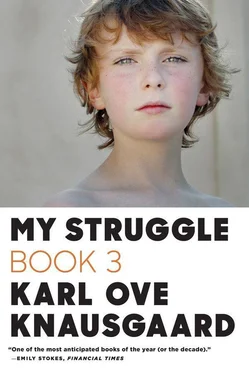The boathouse was gray with age. In some places you could insert a hand between the planks, so we knew what the inside looked like, without any of us having been in there. After peering through these gaps for a while we directed our attention to the roof, which we were going to try to climb. In order to do so we would have to find something to stand on. Nothing in the immediate vicinity was of any use, so we snuck up to the barn and sniffed around there. First of all, we made sure there were no cars up behind the house, there was one there sometimes, the owner was a man, perhaps her son, he would occasionally stop us crossing the drive when we wanted to extend our ski run, which she never did. So we kept an eye open for him.
No car.
Some white cans strewn by the wall. I recognized them from my grandparents’ farm; it was formic acid. A rusty oil drum. A door hanging off its hinges.
Over there, though! A pallet!
We lifted it. It had almost grown into the ground. Full of woodlice and small spiderlike insects crawling all over the place as we lifted. Then we carried it between us all the way across the field and down to the boathouse. Leaned it against the wall. Leif Tore, acknowledged to be the bravest among us, was the first to have a go. Standing on the pallet, he managed to get one elbow on the roof. With his other hand he took a firm grip on the edge of the roof, and then he launched one leg into the air. He got it over the edge, for an instant it rested on the roof, but as soon as his body followed, he lost his grip and plunged like a sack of potatoes, unable to break his fall with his hands. He hit the pallet with his ribs and slid down to the ground.
“Agh!” he screamed. “Oh, shit. Ooohh. Ow! Ow! Ow!”
He slowly got to his feet, studied his hands, and rubbed one buttock.
“Oooh, that hurt! Someone else can try now!”
He looked at me.
“My arms aren’t strong enough,” I said.
“I’ll give it a shot,” Geir said.
If Leif Tore was known for being brave, Geir was known for being wild. Not by nature, because had it been up to him he would have stayed at home drawing and pottering about to his heart’s content all day long, but when he was challenged. Perhaps he was a bit gullible. That summer he and I had built a cart, with a great deal of help from his father, and when it was finished I got him to push me around, just by saying it would make him strong. Gullible but also foolhardy, sometimes all boundaries ceased to exist for him, then he was capable of anything.
Geir chose a different method from Leif Tore’s. Standing on the pallet, he grabbed the protruding roof with both hands and tried to walk up the wall, with all of his weight invested in the fingers he was holding on with. That was, of course, stupid. Even if he had managed it, he would have been standing horizontal to the ground under the roof, in a much worse position than when he started.
His fingers slipped and he plunged butt first onto the pallet, after which he hit the back of his head.
He gave an involuntary grunt. When he stood up I could see that he had really hurt himself. He took a few determined paces to and fro, grunting. Nghn ! Then he mounted the pallet again. This time he adopted Leif Tore’s method. Once he had his leg over the edge, a series of electric charges seemed to shoot through him, his leg banged against the roofing felt, his body writhed, and hey presto, there he was, kneeling on the roof and looking down on us.
“Easy!” he said. “Come on! I can pull you up!”
“You cannot. You aren’t strong enough!” Trond said.
“We can give it a try at any rate,” Geir said.
“You’d better come down,” Leif Tore said. “I have to go home soon anyway.”
“Me too,” I said.
He didn’t seem disappointed, though, up there. Determined would be a more accurate term.
“I’ll jump down then,” he said.
“Isn’t it a bit high?” Leif Tore said.
“Not at all,” Geir said. “Just have to put my mind to it.”
He squatted down and stared at the ground while taking deep breaths as though intending to dive into water. For a second all the tension in his body was gone, he must have changed his mind, but then he braced himself and he jumped. Fell, rolled around, bounced up again like a spring, and started brushing his thigh to signal composure, almost before he was upright.
Had I been the only one of us to climb the roof, it would have been a great triumph. Leif Tore would never have given in. Even if he had spent all night climbing up and falling off he would have gone on trying to reduce the imbalance that had suddenly become apparent. Geir was different though. In fact, he could pull off the most amazing feats, like jumping five meters through the air into a snowdrift, something no one else would dare, and it meant nothing to him. It was of no real consequence. Geir was just Geir, whatever he got it into his head to do.
Without another word, we walked up the hill. In some places the water had carried parts of the road surface along with it, in others there were long sunken dips. We stopped for a while and pressed our heels into an especially soft patch, the wet gravel oozed over the edge of our boots, it was a good feeling. My hands were cold. When I squeezed them my fingers left white marks in the red flesh. But the warts, three on one thumb, two on the other, one on an index finger, three on the back of my hand, didn’t change color, they were a dull reddish-brown color as always and covered with a layer of small dots you could scratch off. Then we went into the other part of the field, the bit that came to an end by a stone wall and the forest behind it; it was as though it was bordered by a long ridge, quite steep, perhaps ten meters high, clad with a line of spruce trees, broken occasionally by a knoll of bare rock. Walking here or in similar areas, I often happily indulged the notion that the countryside resembled the sea. And that fields were the surface of the sea with mountains and islands rising from them.
Oh, to sail in a boat through the forest! To swim among the trees! Now that would be something.
We sometimes used to drive to the far side of the island when the weather was good, park the car on the old shooting range, and walk down to the sea-smoothed rocks, our regular spot, not so far from Spornes beach, where of course I would have preferred to be, as there was sand and I could wade out to a depth that suited me. By the rocks the water was immediately very deep. There was, however, a little inlet, a kind of narrow cleft that filled up with water, which you could climb down into, where you could swim, but it was small and the sea bottom was uneven, covered with barnacles, seaweed, and shells. The waves beat against the rocks outside, causing the water to rise inside, sometimes up to your neck, and the Styrofoam floats on the life jacket I wore were lifted up to my ears. The sheer walls amplified the gurgling and slopping of the water, making them somehow sound hollow. Terrified, I would stand there, suddenly incapable of drawing breath in any other way than with great, shuddering gasps. It was just as creepy when the waves receded and the water level inside sank with a slurp. When the sea was calm, Dad would sometimes inflate the yellow-and-green raft, which I was allowed to lie on and float close to the shore, where, with my bare front stuck to the wet plastic and my back hot and dry from the burning sun, I would splash around, paddling with my hands in the water, which was so fresh and salty, watching the seaweed languidly sway to and fro along the rocks it was attached to, looking for fish or crabs or following a boat on the horizon. In the afternoon the Danish ferry came in, we could see it in the distance when we arrived, and it would be in the Galtesund strait when we left, white, enormous, towering above the low islands and reefs. Was it MS Venus ? Or was it Christian IV ? Kids all along the southern and western sides of the island, and presumably also the kids living on the other side of Galte Sound, on the, for us, foreign island of Hisøya, would go swimming when it came because its wake was immense and notorious. One afternoon, as I was paddling around on the raft, the sudden waves made me sit up and I toppled into the water. I sank like a stone. The water would have been about three meters deep there. I thrashed around with my arms and legs, shouted in panic, swallowed water, which only increased my fear, but it didn’t last more than twenty seconds because Dad had seen everything. He dived in and dragged me to the shore. I regurgitated some water, I was very cold, and we went home. I hadn’t been in any real danger and the incident had no lasting effect, except to leave me with the feeling I had as I walked up the hill to tell Geir what had happened: the world was something I walked on top of, it was impenetrable and hard, it was impossible to sink through it, no matter if it rose in steep mountains or fell in deep valleys. Of course I had known it was like that, but I had never felt it before, the sense that we were walking on a surface.
Читать дальше












